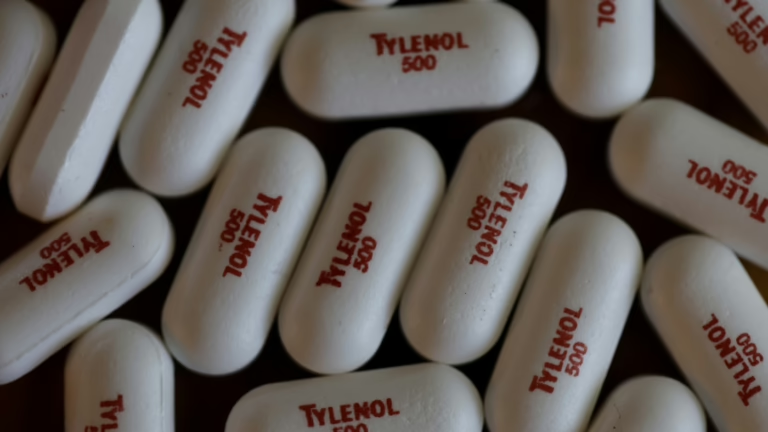Tylenol caplets displayed on September 22, 2025, in San Anselmo, California.
Photo Illustration by Justin Sullivan/Getty Images
hide caption
toggle caption
Photo Illustration by Justin Sullivan/Getty Images
Recently, President Trump advised expectant mothers to “endure” and use Tylenol cautiously, citing concerns about a potential connection between acetaminophen-the active compound in the medication-and autism spectrum disorder.
However, healthcare professionals have firmly rejected this advice, emphasizing that current scientific evidence does not support a direct cause-and-effect relationship between acetaminophen use during pregnancy and autism. The Food and Drug Administration also issued a statement clarifying that although some studies have noted an association, no definitive causal link has been established, and conflicting research exists.

Despite these clarifications, the president’s comments have stirred anxiety, confusion, and feelings of guilt among pregnant women and families affected by autism. Experts in medicine and sociology note that this reflects a recurring theme in the history of autism research-where mothers are often unfairly held responsible.
Martine Lappé, a sociology professor at California Polytechnic State University, San Luis Obispo, who studies the intersection of autism science and family advocacy, remarked, “There is a longstanding tradition in this country of placing blame on mothers, and this narrative continues to resurface in discussions about autism’s origins.”
Autism spectrum disorder is a multifaceted neurodevelopmental condition characterized by diverse traits and varying support needs. Over 100 genes have been linked to autism, underscoring its complexity. Historically, attempts to pinpoint a single cause have led to undue scrutiny of parents, especially mothers, perpetuating stigma.
Historical Misconceptions: The Stigmatization of Working Mothers in Autism’s Early Research
Shortly after autism was first identified in the 1940s, mothers-particularly those who were employed or held college degrees-were unjustly blamed for their children’s condition.
Leo Kanner, a pioneering child psychiatrist, noted that many autistic children he treated had mothers who were well-educated or career-oriented and appeared emotionally distant. He theorized that this lack of maternal warmth caused children to withdraw into autistic behaviors, a concept later dubbed the “refrigerator mother” hypothesis.

Marga Vicedo, a historian of science at the University of Toronto and author on the subject, explains that the label of a “cold mother” was often synonymous with an intellectual woman who pursued interests beyond child-rearing.
She also points out that the prevalence of educated mothers in Kanner’s observations likely reflected socioeconomic factors, as many came from middle- to upper-class families where higher education was more accessible.
This theory gained traction partly due to societal tensions during the post-World War II era, when women’s increasing participation in the workforce clashed with expectations to return to traditional domestic roles.
“Ultimately, blaming mothers served as a powerful mechanism to reinforce their role as primary caregivers,” Vicedo notes.
The “refrigerator mother” hypothesis had harmful consequences, fostering shame and guilt among mothers and even leading to damaging interventions. For instance, in the 1960s, psychoanalyst Bruno Bettelheim advocated for separating autistic children from their mothers.
As genetic research advanced, this theory was debunked, and parents, especially mothers, began to challenge the stigma.
Vicedo observes parallels between the outdated “refrigerator mother” narrative and current claims about Tylenol, highlighting the persistent tendency to oversimplify autism’s causes and place undue responsibility on mothers.
“Focusing so heavily on maternal behavior imposes significant stress and pressure on women,” she emphasizes.
Vaccine Controversies and the Oversimplification of Autism Causes
Decades after the “refrigerator mother” theory lost credibility, vaccines became the next focal point of autism blame.
In 1998, Andrew Wakefield published a now-discredited study suggesting a link between the MMR vaccine and autism.
Though his research was retracted, his medical license revoked, and his claims repeatedly disproven, the controversy diverted attention and resources from more productive autism research, according to Lappé.
Similar to earlier misconceptions, the vaccine-autism myth unfairly emphasized parental decisions in a condition that is predominantly genetic and complex.
“Mothers often bore the brunt of guilt and responsibility when their children were diagnosed with autism,” Lappé explains.
She stresses that such misleading narratives detract from critical discussions about improving healthcare access, childcare support, and embracing neurodiversity.
“If our aim is to enhance health and well-being, policies must reflect the real needs of mothers and caregivers,” Lappé asserts.
Tylenol Controversy and the Burden on Expectant Mothers
Healthcare professionals express concern that recent statements linking Tylenol to autism place pregnant women and their families in a difficult position.
Dr. Rachel Follmer, a developmental and behavioral pediatrician at Ann & Robert H. Lurie Children’s Hospital of Chicago, notes, “Women, mothers, and healthcare providers face conflicting messages, creating a challenging environment for decision-making.”
Follmer worries that fear of using Tylenol-the most commonly recommended pain reliever during pregnancy-may lead some women to avoid treating pain or fever altogether, which can have serious health consequences.

The Society for Maternal-Fetal Medicine highlights that untreated fever, especially in the first trimester, can increase risks such as miscarriage, birth defects, and premature delivery.
Sarah Richardson, a Harvard University professor specializing in the history of science and gender studies, points out that such remarks about Tylenol contribute to heightened scrutiny of women’s choices during pregnancy.
“We live in a time of intense parenting pressures, where there is an expectation to do everything possible to ensure the best outcomes,” Richardson says. “Yet, there is little acceptance that many factors influencing development are beyond our control.”


















